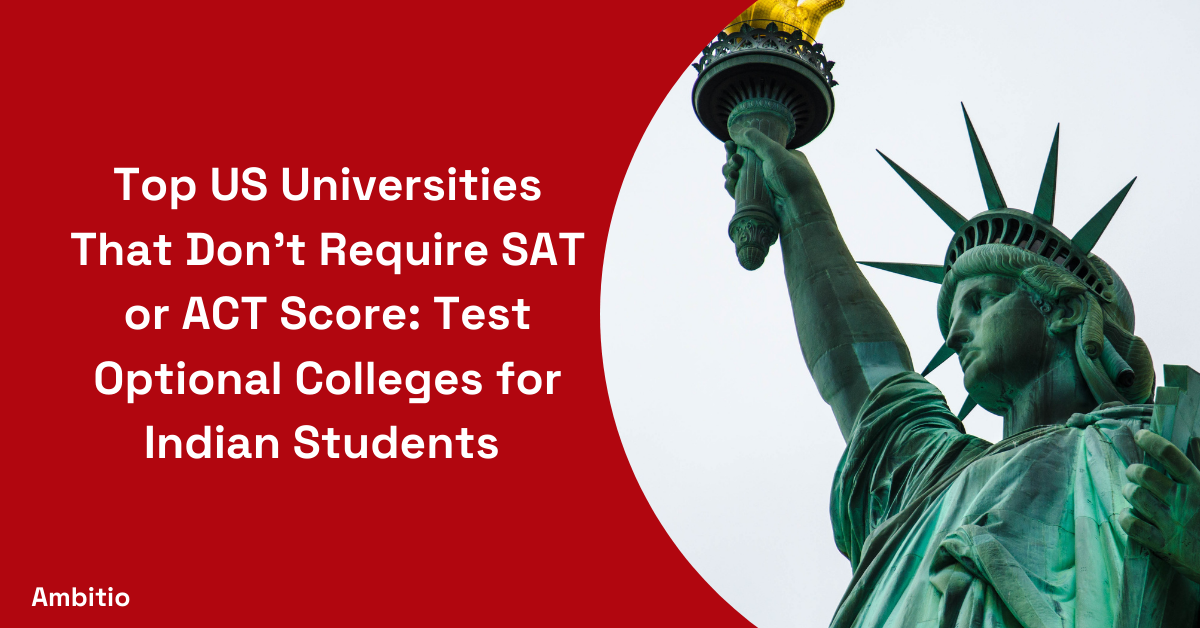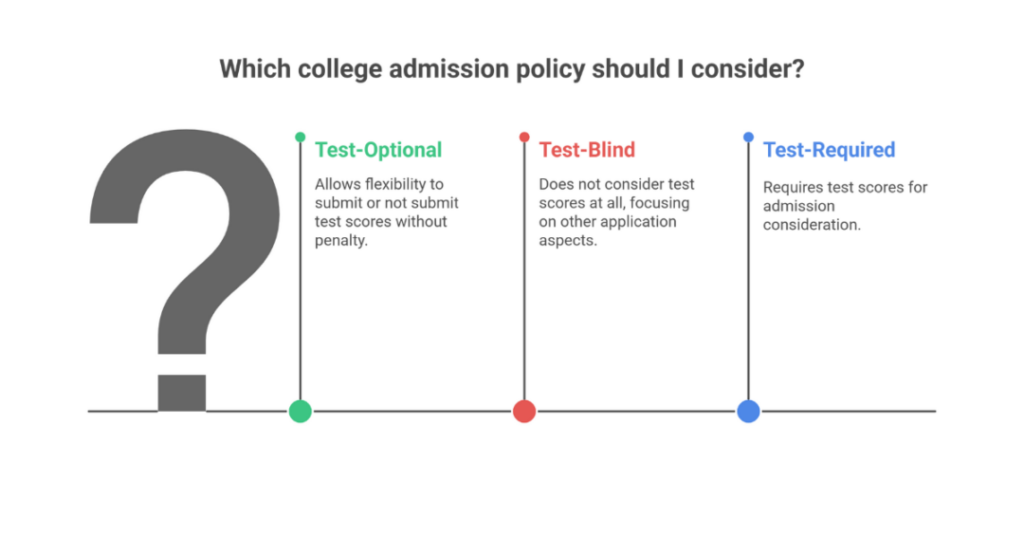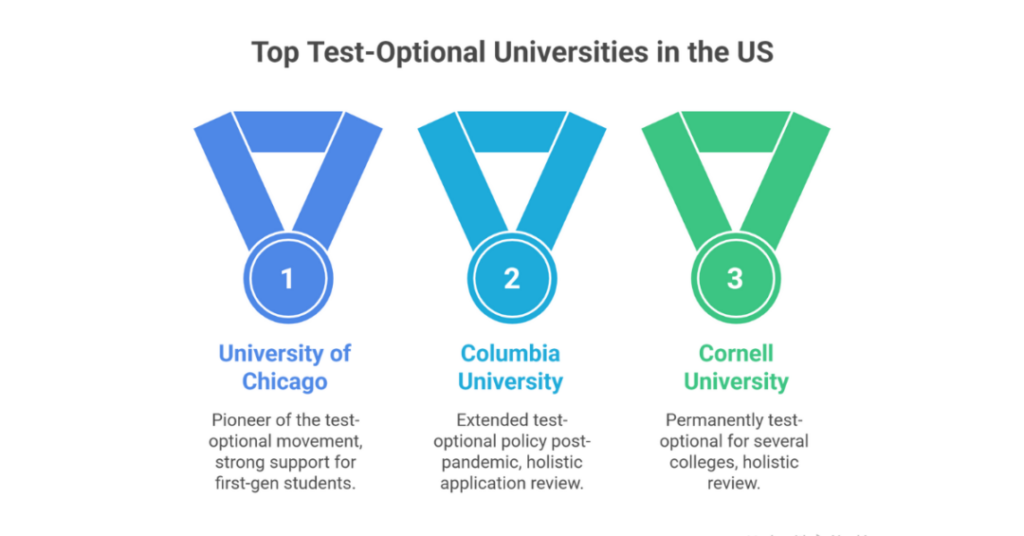31 July 2025
7 minutes read
Top US Universities That Dont Require SAT or ACT Score: Test Optional Colleges for Indian Students

Key Takeaways
- Top US universities that dont require SAT offer students greater flexibility in the admission process, making academic performance and personal achievements more significant.
- Top US universities that dont require SAT still accept strong test scores if submitted, allowing students to enhance their applications strategically.
- Top US universities that dont require SAT include elite institutions with test-optional policies, ensuring access to quality education without standardized test pressure.
The terrain of US college admissions has transformed enormously in recent years. One of the most significant shifts is the increase in test-optional policies, which permit students to apply to leading colleges without providing standardized test scores such as the SAT or ACT. This change has empowered a lot of students who may not have access to ACT prep materials or who simply don’t believe that their test scores reflect their academic abilities.
Whether you’re a senior in high school researching your choices or a parent comparing colleges and universities to study in USA, this guide can assist you as you weed your way through top-ranked colleges and universities that are test optional and do not accept SAT or ACT scores. What does that actually mean? Why is this even important? And which high-prestige institutions permit students to apply without requiring them to report standardized test scores?
What Does a “Test-Optional College” Mean?
Most individuals mix test-optional with test-blind or test-required colleges. Knowing the distinctions is crucial to making well-informed choices, particularly if you feel that your exam scores such as the SAT and ACT accurately represent your academic potential. Although colleges are test-optional, they still use scores if provided—contrary to test-blind colleges that disregard them entirely.

Test-optional schools offer candidates the option to include test scores or not to include test scores at all. Selecting not to send in your SAT or ACT does not hurt your application.
Key Terms Defined:
| Term | Definition |
|---|---|
| Test-Optional | Students may choose whether or not to submit standardized test scores. |
| Test-Blind | The school does not consider test grades at all, even if submitted. |
| Test-Required | Students must submit SAT or ACT scores to be considered for admission. |
This adaptability has proved particularly timely since 2023 because numerous colleges and universities started reconsidering how they screen applicants.
Why Are Colleges Dropping the SAT and ACT Requirements?
Several top schools now do not require the SAT or ACT due to concerns over equity, access, and the relevance of standardized tests. The COVID-19 pandemic accelerated this trend, with many institutions initially going test-optional out of necessity. Since then, the results have been promising, showing that students can thrive regardless of whether they submit test scores.
Fun Fact: The University of Chicago was the first elite university to go test-optional back in 2018—a bold move that inspired many US universities to reconsider the weight of standardized test grades.
Other reasons include:
- Socioeconomic barriers to test prep and fees
- Limited access to testing centers
- An emphasis on holistic admissions
Many colleges and universities have adopted test-optional policies permanently or at least through 2023 and beyond.
Top US Test Optional Colleges and Universities That Don’t Require SAT or ACT Scores
Here is a curated list of US colleges and universities, many of which are ranked in the top 20, that don’t need SAT or ACT grades. These institutions assess candidates based on GPA, coursework, essays, recommendations, and extracurriculars.

Prestigious Universities That Are Test-Optional:
| University Name | Test Policy | Notes |
| University of Chicago | Test-Optional | Pioneer of the movement, offers strong support to first-gen students. |
| Columbia University | Test-Optional | Extended policy for multiple cycles post-pandemic. |
| Cornell University | Test-Optional | Several colleges within the university are permanently test-optional. |
| Brown University | Test-Optional | Holistic application review. |
| Duke University | Test-Optional | Strongly recommends submission if available, but not required. |
| University of California System | Test-Blind | Does not accept SAT or ACT scores at all. |
| Wake Forest University | Test-Optional | Among the first to go test-optional pre-COVID. |
| Boston University | Test-Optional | Encourages students who feel confident in their test performance. |
| Amherst College | Test-Optional | Prestigious liberal arts college. |
| Williams College | Test-Optional | Offers one of the best undergraduate experiences in the US. |
What Happens If You Submit Your Standardized Test Scores?
Even if colleges do not require SAT, scores may still play a role in the admission process if submitted. A strong SAT or ACT score can bolster an application, especially for merit scholarships or placement decision.
Consider the Following:
- Students to submit SAT or ACT grade if they believe their scores help their profile.
- Some colleges may require scores for specific programs.
- Others need SAT or ACT grades for international students in lieu of language proficiency exams like TOEFL or IELTS.
Additional Exams Considered:
- TOEFL / IELTS for English proficiency
- SAT Subject Test Scores (discontinued in the US, but considered by some international schools)
- GRE or GMAT for graduate programs
Pros and Cons of Applying Without Test Scores to Universities That do not Require the SAT and ACT Scores
Skipping the SAT or ACT grade may benefit some students, especially when applying to colleges in the US that no longer require students to take the test. However, it’s important to weigh the advantages and limitations carefully. Many institutions now emphasize other aspects of the application, such as a compelling statement of purpose, a well-crafted personal statement, strong letter of recommendation, and a detailed resume.
While some on the list of colleges may not ask you to submit scores, others still expect ACT or SAT scores, especially if you’re targeting competitive programs or considering taking the ACT in the US.
Pros:
- Reduces pressure from test scores
- Allows focus on grades, essays, and recommendations
- More inclusive for students with limited ACT prep access
Cons:
- Certain colleges that require scores will not consider your application without them
- You may miss out on merit-based scholarships
- Some schools might interpret not submitting your scores as a lack of confidence
Tip: If you’re applying to colleges that are test-optional, ask: “Do I believe my test scores would enhance my application?” If yes, submit your SAT or ACT grades to be admitted with more competitive advantage.
Do International Students Need to Submit Exam Scores Including SAT Scores?
Many US universities treat international students differently when it comes to standardized tests, and the admission process often varies significantly compared to domestic applicants. While some institutions require SAT grades from all students, others may place greater emphasis on English proficiency exams like the TOEFL or IELTS. For international applicants, these tests often carry more weight in determining academic readiness and language fluency.
In addition to these, certain universities also consider scores from national curricula, such as A-Levels, the IB Diploma, or country-specific board exams. Some schools even waive the SAT or ACT entirely if students present strong academic records or alternative assessments. Understanding each university’s specific requirements is essential, as submitting the right set of test scores can significantly strengthen your application.
Quick Glance:
| School | SAT/ACT Policy for International Students | Language Requirement |
| University of Chicago | Test-Optional | TOEFL or IELTS |
| Columbia University | Test-Optional | TOEFL or IELTS |
| NYU | Flexible Testing Policy | TOEFL/IELTS/Duolingo |
| UCLA | Test-Blind | TOEFL/IELTS |
| Amherst College | Test-Optional | TOEFL/IELTS |
Always check the official admission process page of each university to verify whether they require standardized test scores.
How to Decide Whether to Submit SAT or ACT Scores?
Choosing to submit their scores is a personal decision, especially when applying to test-optional colleges in the US, where a university does not require SAT results, nor do students need to submit test scores for admission consideration. While scores to test-optional policies mean that SAT and ACT are not mandatory, some schools still look at test scores when available. Therefore, choosing not to submit test scores doesn’t require SAT but could impact how your application is reviewed depending on the institution.
Here are a few guiding questions:
- Are your SAT and ACT scores above the school’s average?
- Do your scores show consistent academic strength?
- Have you taken the SAT or ACT more than once and improved?
- Does the school require test scores for specific majors or scholarships?
If you answered “yes” to most, it may be worth sending test scores. If not, remember: many colleges do not require SAT or ACT scores to be admitted.
Conclusion
The rise of colleges that don’t require SAT or ACT has transformed how students prepare and apply to schools in the US. With hundreds of colleges embracing test-optional policies, you can now focus on aspects of your application that truly showcase your potential.
Whether you’re targeting selective colleges, top liberal arts colleges, or public universities in the US, remember: test scores for admission are just one part of your story. With thoughtful planning and honest self-assessment, you can succeed whether or not you choose to submit your test scores. Do your research using a list of schools that match your goals. Check each school’s policy closely to see if they require the SAT or ACT. Trust that scores are not required to prove your worth.
Let your achievements, passions, and resilience shine with Ambitio, your trusted study abroad partner—with or without SAT.
FAQs
What are some top US universities that dont require SAT for admission?
Some of the top US universities that dont require SAT include the University of Chicago, Bowdoin College, and Wake Forest. These top US universities that dont require SAT follow test-optional policies, focusing on academics and personal achievements.
Are top US universities that dont require SAT truly test-optional?
Yes, many top US universities that dont require SAT are genuinely test-optional, meaning students can choose whether or not to submit scores. These top US universities that dont require SAT will not penalize applicants who decide against sending standardized test scores.
Do top US universities that dont require SAT still accept SAT scores if submitted?
Yes, while top US universities that dont require SAT don’t mandate test scores, they will consider them if included. Students often submit scores to top US universities that dont require SAT when they believe their results can strengthen their applications.
Why do top US universities that dont require SAT adopt such policies?
The reason top US universities that dont require SAT move toward test-optional models is to create more equitable access to education. These top US universities that dont require SAT recognize that not all students have equal opportunities to prepare for or take standardized tests.
Can international students apply to top US universities that dont require SAT?
Yes, international students are welcome to apply to top US universities that dont require SAT, though they may still need to provide TOEFL or IELTS scores. These top US universities that dont require SAT often evaluate international students using a broader set of criteria.
Are top US universities that dont require SAT still considered elite institutions?
Many top US universities that dont require SAT are ranked among the top 20 nationally. This shows that top US universities that dont require SAT maintain rigorous academic standards even without relying on standardized test requirements.
Should I apply to top US universities that dont require SAT if I have low test scores?
If your test scores aren’t strong, applying to top US universities that dont require SAT can be a smart choice. These top US universities that dont require SAT let you focus on your GPA, essays, and extracurriculars without being held back by test performance.

You can study at top universities worldwide!
Get expert tips and tricks to get into top universities with a free expert session.
Book Your Free 30-Minute Session Now! Book a call now




























